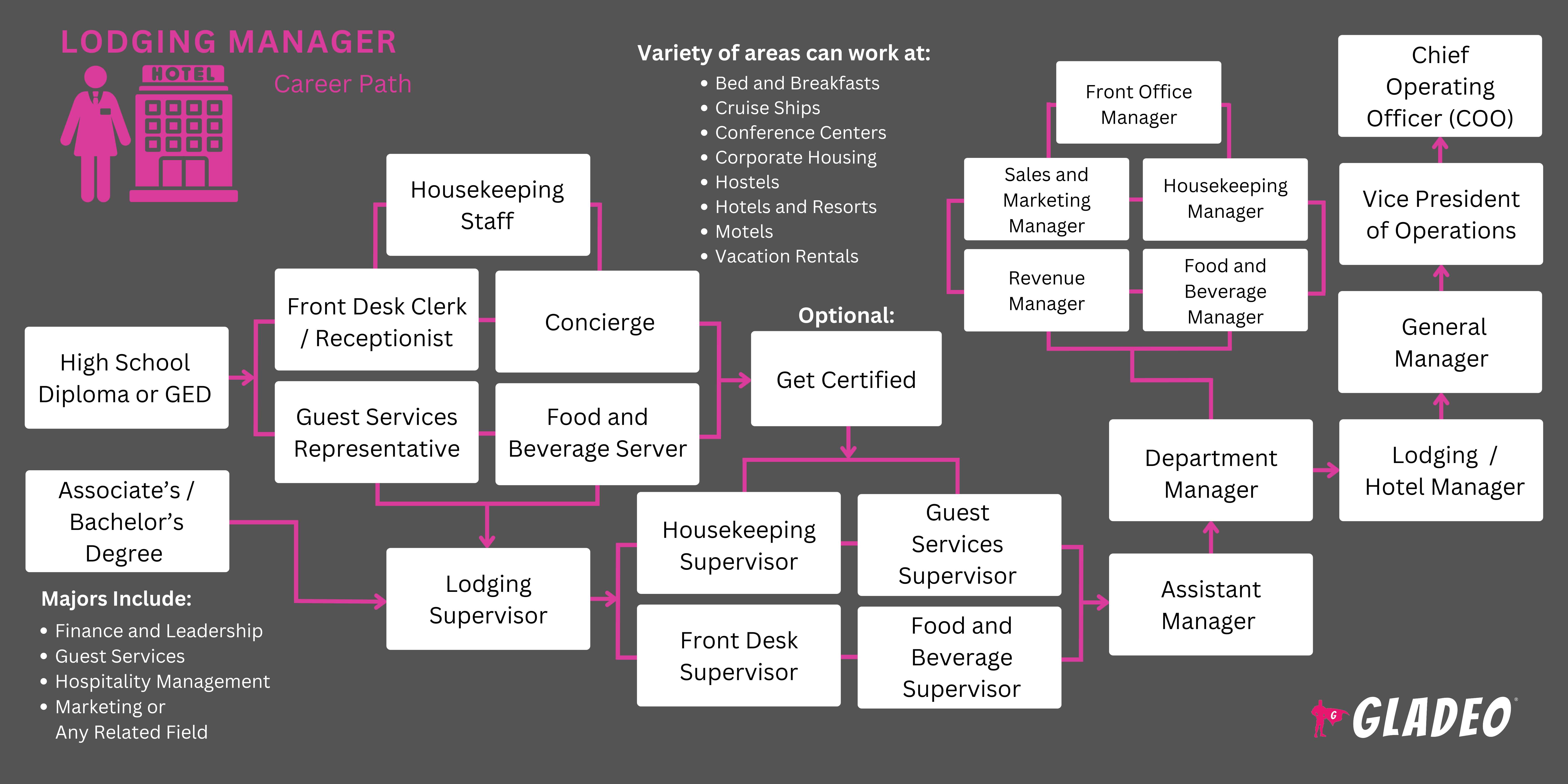Spotlights
Bed and Breakfast Innkeeper, Front Desk Manager, Front Office Director, Front Office Manager, Guest Relations Manager, Guest Services Manager, Hotel Manager, Night Manager, Resort Manager, Rooms Director
Nothing can spoil a vacation faster than a bad lodging experience! Imagine walking into a hotel where there’s a huge line to check in, your room is dirty, the pool is closed, and the food is terrible. These and a thousand other things can happen if there’s not an experienced Lodging Manager running the establishment.
From hotels to mega-resorts, they ensure lodging facilities and staff provide guests with a pleasant experience during their stay. This includes establishing standards, overseeing operations, reviewing customer feedback, and keeping an eye on maintenance issues. They also handle budgets, hire new staff, monitor regulatory compliance, and provide team leadership and guidance.
Note, some establishments are so large, they have multiple managers who handle specific areas, such as the front desk, revenue, or convention services.
- Creating memorable experiences for guests
- Enhancing the reputation and profitability of lodging establishments
- Leading and developing hospitality professionals
- Implementing innovative solutions to improve services
Working Schedule
Lodging Managers typically work full-time, including evenings, weekends, and holidays. They are also on call to address urgent issues.
Typical Duties
- Oversee daily operations and address issues or problems
- Monitor staff to ensure performance, efficiency, and customer service
- Coordinate schedules and activities
- Hire, manage, and help train staff members
- Conduct routine inspections of areas including rooms, lobbies, dining areas, parking lots, pools, and grounds
- Examine kitchens. Sample food and dishes for quality assurance
- Monitor building maintenance work
- Ensure compliance with health, safety, and lodging regulations
- Respond to guest questions. Try to resolve complaints promptly
- Ensure housekeeping standards are maintained
- Establish budgets, allocate funds, and approve purchases
- Maintain or oversee financial records (e.g., work orders, guest billing, supply purchases, payroll, etc.)
- Review occupancy rates. Track financial performance and compare against quarterly projections
- Help devise marketing campaigns to attract more guests and appeal to previous guests
- Manage hosted events and conferences
Additional Responsibilities
- Negotiate contracts with suppliers and vendors
- Stay updated on industry news and best practices
- Manage or oversee social media and online guest reviews
- Develop and enforce policies and procedures
- Network with travel agents, tour operators, and event planners
Soft Skills
- Active listening
- Adaptability
- Attention to detail
- Budget management
- Business acumen
- Communication
- Compliance mindset
- Conflict resolution
- Cost efficiency
- Customer service
- Dependable
- Empathy
- Integrity
- Interpersonal skills
- Leadership and management
- Multitasking
- Organizational skills
- Problem-solving
- Teamwork
- Time management
Technical Skills
- Asset management and inventory control
- Bookings and reservations systems
- Budgeting and financial management
- Building energy management and sustainability
- Building maintenance management
- Contract negotiation and vendor management
- Customer Relationship Management (CRM) software
- Data analysis
- Event planning
- Health and safety regulations
- Human resources management
- Knowledge of local, state, and federal building codes and regulations (ADA compliance, fire safety standards, environmental regulations, etc.)
- Marketing and sales
- Mechanical and electrical systems
- Negotiation skills
- Performance analysis
- Project management
- Property Management System (PMS) software
- Risk assessment and emergency preparedness
- Scheduling and coordinating logistics and deliveries
- Smart building operations
- Bed and breakfasts
- Hostels
- Hotels
- Motels
- Resorts
- Vacation rentals
Lodging Managers play a critical role in establishing and maintaining the reputation of their establishment. They are expected to maintain high standards of service and ensure guest satisfaction. They’ve got to multitask every day, anticipate and address issues in advance, and keep an eye out for unexpected problems.
Handling guest complaints and resolving issues swiftly can be challenging, especially when guests are acting frustrated or unreasonable. Still, managers must keep their cool and do their best, to please the customers. Work shifts can run long, especially during busy seasons. They also have to be on call for emergencies.
The lodging industry is evolving with the increased use of technology to enhance guest experiences, with mobile check-ins, mobile payments, digital concierge services, and personalized marketing now the norm. In fact, many establishments are using tech for labor management and scheduling because they employ fewer staff members than before the pandemic. But such tech-related trends come with their own challenges when things go wrong.
Sustainability is also a hot topic, with establishments adopting eco-friendly practices such as energy-efficient lighting, water conservation measures, reduced plastics usage, and sourcing local and organic materials for dining options. The push towards sustainability is supported by certifications and green initiatives.
- Lodging Managers need at least a high school diploma or equivalent
- Some start in entry-level roles such as front desk staff or interns, then work their way up to managerial positions. Others complete an associate degree in hotel management or a bachelor’s degree in hospitality management, then start as manager trainees
- Completing a combination of relevant work experience and academic credentials may be the ideal option!
- Common college courses may include:
- Event Management
- Financial Management
- Food and Beverage Management
- Hospitality Management
- Hotel Operations
- Human Resource Management
- Marketing
- Sustainable Hospitality
- Tourism and Destination Management
- Lodgement Managers need to develop proficiency in relevant software tools such as:
- Bookings and reservations systems
- Budgeting and financial programs
- Customer Relationship Management (CRM) software
- Data analysis programs
- Human resources management software
- Inventory software
- Marketing programs
- Property Management System (PMS) software
- For those who want to add to their credentials, consider options such as:
- The American Hotel & Lodging Educational Institute’s Certified Hospitality Manager Online Learning Suite and Exam or Hospitality and Tourism Management program
- There are also American Hotel and Lodging Association certifications such as:
- Other certifications include:
- A college degree is not required for all jobs in this field. Some workers can get started in entry-level positions with enough related work experience. An associate degree in hotel management or a four-year degree in hospitality management can help get your foot in the door.
- Look for programs that offer practical experiences, like internships with hotels or resorts.
- Consider program costs, financial aid availability, and any connections with industry partners that could lead to employment opportunities.
- Look for schools with a chapter of the Eta Sigma Delta Honor Society for hospitality students.
- In high school, take courses in business, economics, accounting, and hospitality, if offered
- Take advanced placement (AP) or dual enrollment courses related to business and management
- Work on your communication and interpersonal skills. Volunteer for activities or clubs where you can get practice in leadership and management roles
- Practice public speaking by joining a speech or debate team
- Consider learning a second language
- Develop organizational skills by helping with school or community events
- Seek part-time jobs or internships in the hospitality industry, such as at local hotels or resorts. If you can’t find any, consider opportunities to work in facilities management or customer service
- Attend local workshops or seminars on hospitality or business management
- Network with professionals by attending career fairs or industry events
- Research trends in the hospitality industry to stay updated on current practices
- See if your college hosts a chapter of the Eta Sigma Delta Honor Society for hospitality and tourism management students

- Review job postings on portals like Indeed and Glassdoor. Upload your resume and sign up for new job alerts
- Ask your school’s career counselor or service center for help preparing resumes and looking for jobs
- If needed, apply for entry-level roles such as front desk clerk or facilities management assistant
- Write your Lodging Manager resume to highlight relevant education, certifications, internships, and skills. Make sure to avoid any spelling or grammar mistakes
- Notice the keywords in job postings, and try to work them into your resume. Keywords might include:
- Asset Management
- Budgeting and Financial Management
- Emergency Preparedness
- Energy Management
- Event Management
- Facility Operations
- Financial Management
- Food and Beverage Management
- Health and Safety Compliance
- Hospitality Management
- Hotel Operations
- Human Resource Management
- Marketing
- Project Management
- Sustainable Hospitality
- Vendor Management
- Review common Lodging Manager interview questions to practice your replies in mock interviews
- Sample questions might include “If you were starting work at a new hotel tomorrow, what would you do to get up to speed on hotel operations?” or “How have you saved time or reduced cost at your current/previous hotel?”
- Read about trends and be familiar with the technologies and terminology before going into interviews
- Prepare for interviews by researching the hiring organization’s website to learn about their mission and typical guests
- If given the names of the persons who will interview you, look up their professional biographies to learn a little about them
- Dress professionally for interview success!
- Express your interest in career advancement to your supervisor. Ask if there are specific professional development classes or certifications they’d like you to complete
- Do your best to ensure the facility under your supervision is profitable and keeps guests happy
- Provide outstanding customer service. Treat all guests and visitors with dignity and respect, and pay attention to customer reviews and feedback
- Seek feedback from supervisors and colleagues to identify areas for improvement
- Demonstrate reliability and establish a reputation as a competent, innovative manager
- Be a thoughtful supervisor who takes care of staff and contractors and inspires them to do their best
- Consider earning a Master’s in Business Administration (MBA). It could qualify you for higher management positions
- Be active within professional organizations like the American Hospital Association, American Hotel & Lodging Association, or Association of Lodging Professionals
- If necessary, consider relocating or applying to a larger establishment
- Read industry news and participate in discussion groups to learn about trends
Websites
- Accreditation Commission for Programs in Hospitality Administration
- American Hospital Association
- American Hotel & Lodging Association
- American Hotel & Lodging Educational Institute
- Association of Lodging Professionals
- Building Operating Management Magazine
- Building Owners and Managers Association International
- Facility Management Journal
- Hospitality Net
- Hospitality Online
- Hotel Management Network
- International Association of Venue Managers
- International Council on Hotel, Restaurant, and Institutional Education
- National Facilities Management & Technology
- National Restaurant Association
- Society for Maintenance & Reliability Professionals
- U.S. Green Building Council, Inc.
Books
- HOSPITALITY 2.0: Digital Revolution in the Hotel Industry, by Ira Vouk
- Hospitality DNA: Career Journeys with Unprecedented Insights from Industry Award Winners, by Dave Nitzel and Dave Domzalski
- Hotel Management and Operations, by Denney G. Rutherford
- The Heart of Hospitality, by Micah Solomon
It can take years to acquire the necessary skills, experience, and academic requirements to land a job as a Lodging Manager. Many workers start in other industry-related positions and then work their way up. If you’re curious about some related career options, check out our list below!
- Administrative Services Manager
- Concierge
- Customer Service Representative
- Event Planner
- Facilities Manager
- First-Line Supervisor of Entertainment and Recreation Workers
- Food Service Manager
- Gambling Services Worker
- Human Resources Specialist
- Meeting, Convention, and Event Planner
- Property, Real Estate, and Community Association Manager
- Restaurant Manager
- Sales Manager
- Spa Manager
Newsfeed

Featured Jobs

Online Courses and Tools







